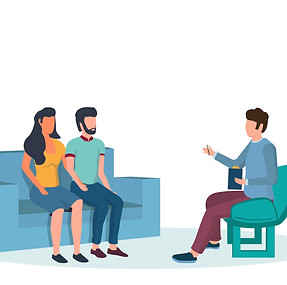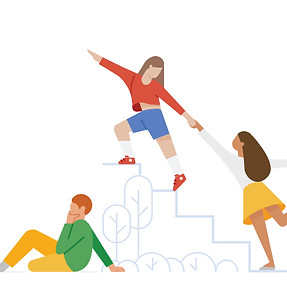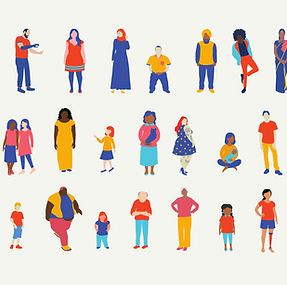Mental Health Services

Individual counseling is a joint process between a therapist and a person in therapy. Common goals of therapy can be to inspire change or improve quality of life. People may seek individual psychotherapy for help with issues that are hard to face alone. This can help people overcome obstacles to their well-being. It can also increase positive feelings, such as compassion and self-esteem. People in therapy can learn skills for handling difficult situations, making healthy decisions, and reaching goals.

Lighthouse mental health counseling for couples helps them to recognize and resolve conflicts and improve their relationships. Through online teletherapy, you can make thoughtful decisions about rebuilding and strengthening your relationship or going your separate ways.
The therapist will want to know the main problems you are experiencing, and what causes most of your stress within the relationship. Some aspects of relationship stress that may be discussed include parenting conflicts, intimacy issues, and communication issues (or other types of distress).

Teen Therapy focuses on young children, teens, and adolescents with mental health-related issues regarding school and home functioning. Online therapy for teens eliminates many of the barriers that may have previously deterred them from seeking assistance. It offers a sense of anonymity that can encourage open and honest communication, allowing teens to express their thoughts and emotions more freely.
It provides solutions to teens who struggle with mental health-related issues such as anxiety, oppositional defiant behaviors, trauma, and/or who are experiencing a dysfunctional or stressful home and school environment.

Family therapy or family counseling is designed to address specific issues that affect the psychological health of the family, such as major life transitions or mental health conditions. It may be used as the primary mode of treatment or as a complementary approach. Family therapy is a type of psychological counseling (psychotherapy) that can help family members improve communication and resolve conflicts.
Family counseling is designed to address specific issues that affect the psychological health of the family, such as major life transitions or mental health conditions. It may be used as the primary mode of treatment or as a complementary approach.

Cognitive behavioral therapy is a psycho-social intervention that aims to improve mental health. CBT for depression focuses on challenging and changing unhelpful cognitive distortions and behaviors, improving emotional regulation, and developing personal coping strategies that target solving current problems.
As treatment progresses and depressive symptoms improve, CBT focuses on teaching individuals strategies to prevent relapse. This includes recognizing early signs of depression and using the skills learned in therapy to manage them effectively.

EMDR Therapy
Eye movement desensitization and reprocessing (EMDR) for treating post-traumatic stress disorder (PTSD). PTSD often occurs after experiences such as military combat, physical assault, rape, car accidents or any traumatic experience. This method of therapy helps individuals to cope with traumas or other symptoms they may face.
EMDR is a psychotherapy treatment that was originally designed to alleviate the distress associated with traumatic memories. EMDR therapy facilitates the accessing and processing of traumatic memories and other adverse life experience to bring these to an adaptive resolution.

Teletherapy
Teletherapy is the online delivery of counseling and mental health therapy services via high-resolution, live video conferencing. Teletherapy sessions are very similar to traditional speech, occupational therapy, or mental health sessions. Instead of sitting in the same room, clients and therapists interact via live video conferencing.
This allows more flexible schedules and appointments for therapy sessions.
Most importantly, it's just as effective as regular therapy sessions while protecting privacy. Also, those who feel more comfortable staying in their homes may be a better option for teletherapy.

Client Centered Therapy
Person-centered therapy or client-based therapy, employs a non-authoritative approach that allows clients to take more of a lead in sessions such that, in the process, they discover their own solutions, while the therapist acts mainly as a guide or a source of support for the client.
Person-centered therapy, also known as Rogerian therapy or client-based therapy, employs a non-authoritative approach that allows clients to take more of a lead in sessions such that, in the process, they discover their own solutions.

Christian Counseling
Christian counseling is a type of therapy that integrates traditional talk therapy methodologies with Christian belief practices by incorporating theological concepts.
It focuses on the navigation of spiritual concerns and everyday life struggles encountered by Christians. Also incorporate and integrate psychological theories and interventions as well.
Christian counseling is a broad category of emotional and relationship support that draws on the principles of Christianity to help clients cope with challenges.

Multicultural Counseling
Multicultural counseling is a term used to describe a specific type of counseling practice that acknowledges how various aspects of a patient's cultural identity might influence their mental health. The approach centers on the idea that demographic factors such as race, ethnicity, and gender identity play a critical role in how someone experiences the world and relates to others.
Multicultural therapy is a form of talk therapy that aims to address the concerns of clients whose race, ethnicity, religion, gender identity, sexual orientation, income, disability status, or other social factor(s) falls outside of the majority or outside the dominant social group.
Contact Us Today for a Free
Consultation
Please contact us through the form below or give us a call.
Looking forward to speaking with you.
We are committed to your privacy.
